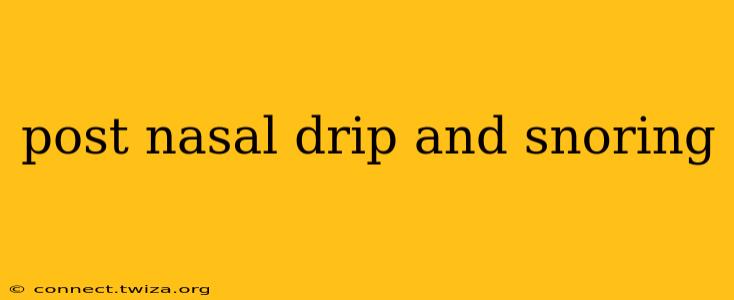Post nasal drip and snoring often go hand-in-hand, creating a frustrating cycle of discomfort and sleep disruption. Understanding the connection between these two common issues is crucial for effective treatment. This article explores the relationship between post nasal drip and snoring, examining the causes, symptoms, and effective management strategies.
What is Post Nasal Drip?
Post nasal drip (PND) refers to excess mucus dripping down the back of your throat. This mucus, usually produced by the lining of your nose and sinuses, can be triggered by allergies, infections, or irritants. The constant drip can lead to a sore throat, coughing, and a feeling of something stuck in the back of your throat. It's a common condition affecting people of all ages.
How Does Post Nasal Drip Contribute to Snoring?
The excess mucus from post nasal drip can significantly contribute to snoring. The thick mucus can irritate the throat and nasal passages, causing inflammation and swelling. This swelling can narrow the airways, making it harder for air to pass through smoothly during sleep. The resulting vibrations in the narrowed airway are what cause the snoring sound. In severe cases, this narrowing can lead to sleep apnea, a more serious condition characterized by pauses in breathing during sleep.
What are the Symptoms of Post Nasal Drip?
Recognizing the symptoms of post nasal drip is essential for diagnosis and treatment. Common symptoms include:
- A constant dripping sensation at the back of your throat. This is the most defining symptom.
- Coughing, especially at night. The drip irritates the throat, triggering a cough reflex.
- Sore throat. The constant irritation from the mucus can lead to a sore, scratchy throat.
- Frequent throat clearing. You may find yourself constantly clearing your throat to dislodge the excess mucus.
- Bad breath. The mucus can harbor bacteria, leading to unpleasant breath.
Does Post Nasal Drip Always Cause Snoring?
While post nasal drip is a common contributor to snoring, it doesn't always cause it. Many other factors can lead to snoring, including:
- Obesity: Excess weight can narrow the airways.
- Alcohol consumption: Alcohol relaxes throat muscles, increasing the likelihood of snoring.
- Sleeping position: Sleeping on your back can worsen snoring.
- Nasal congestion: Blockages in the nasal passages restrict airflow.
- Anatomical factors: Certain structural features of the nose and throat can predispose individuals to snoring.
How Can I Treat Post Nasal Drip and Snoring?
Treating post nasal drip and its associated snoring often involves a multi-pronged approach:
- Identify and address the underlying cause: Allergies, infections, or environmental irritants need to be identified and managed appropriately. This might involve allergy medication, antibiotics (for infections), or changes to your environment.
- Lifestyle changes: Losing weight if overweight, avoiding alcohol before bed, and changing sleeping positions (sleeping on your side) can all help.
- Humidifier: A humidifier can add moisture to the air, helping to thin the mucus and improve airflow.
- Saline nasal spray or rinse: These can help to clear nasal passages and thin the mucus.
- Over-the-counter medications: Decongestants and antihistamines can help reduce inflammation and mucus production, although long-term use should be discussed with a doctor.
- Medical interventions: In more severe cases, a doctor may recommend further interventions, such as surgery to correct structural issues or CPAP therapy for sleep apnea.
Can Post Nasal Drip Cause Sleep Apnea?
Yes, in some cases, severe post nasal drip can contribute to or worsen sleep apnea. The significant airway narrowing caused by inflammation and mucus buildup can lead to intermittent pauses in breathing during sleep. If you experience excessive daytime sleepiness, gasping for air during sleep, or frequent awakenings, it's crucial to consult a doctor to rule out sleep apnea.
How is Post Nasal Drip Diagnosed?
Diagnosing post nasal drip usually involves a physical examination, a review of your medical history, and possibly some allergy testing. Your doctor will assess your symptoms and may perform a nasal endoscopy to examine your nasal passages and throat more closely.
When Should I See a Doctor?
If your post nasal drip and snoring are severe, persistent, or accompanied by other symptoms like daytime sleepiness, difficulty breathing, or significant throat discomfort, you should consult a doctor. They can help determine the underlying cause and recommend the most appropriate treatment plan.
This information is intended for educational purposes only and does not constitute medical advice. Always consult with a healthcare professional for any health concerns or before making any decisions related to your health or treatment.
